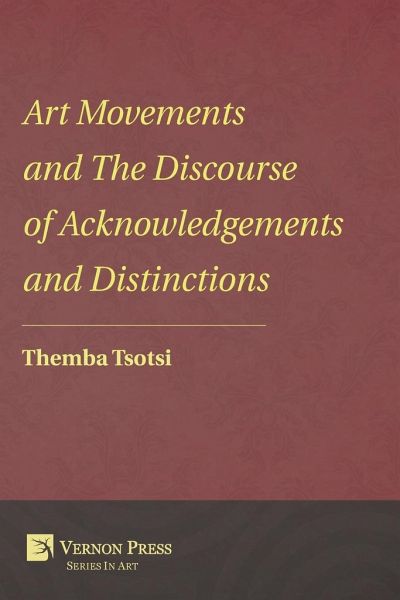
Art Movements and the Discourse of Acknowledgements and Distinctions
Versandkostenfrei!
Versandfertig in 1-2 Wochen
28,99 €
inkl. MwSt.
Weitere Ausgaben:

PAYBACK Punkte
14 °P sammeln!
This is a work of critical theory in the deconstructionist tradition. It investigates the impact and role of visual art practice in cultural dispensation. Its central argument is that conceptions of 'leadership' and of 'being a subject' (or subjugation) play a formative role in the manner with which cultural ideas are appropriated and spread out in organic interactions within the community. The arguments advanced in this work demonstrate that leadership conceptions are disseminated as 'signs' (a conceptual term for how ideas and their significance are understood in the context of cultural disp...
This is a work of critical theory in the deconstructionist tradition. It investigates the impact and role of visual art practice in cultural dispensation. Its central argument is that conceptions of 'leadership' and of 'being a subject' (or subjugation) play a formative role in the manner with which cultural ideas are appropriated and spread out in organic interactions within the community. The arguments advanced in this work demonstrate that leadership conceptions are disseminated as 'signs' (a conceptual term for how ideas and their significance are understood in the context of cultural dispensation) and that signs have historical roots and connotations. Using deconstructionist techniques like diffErance, this work concretises the critical in the discourse which states that 'signs' in the cultural dispensation are in constant interaction with each other in terms of defining their historic, epistemic and contemporary 'meaning'. The Discourse of Acknowledgements and Distinctions introduces three concepts that account for themselves through the infinite propensities of social contexts and the 'signs' that anchor them for referral. These are the notions of Cerebrinity, Hysteridence and Remembrance. The use of psychoanalysis - and of the perspectives of Kristeva, Jung and Freud - distinguishes this book from other works of critical theory that deal with art and art movements. The book aims to illuminate on the propensity of the community to participate in its own subjugation in the context of Modernity. It is concise and incorporates critical theory perspectives by writers like Baudrillard, Lyotard, Kristeva and Spivak. It can be appreciated by art students interested in the intersection between visual art, critical theory and psychoanalysis.














